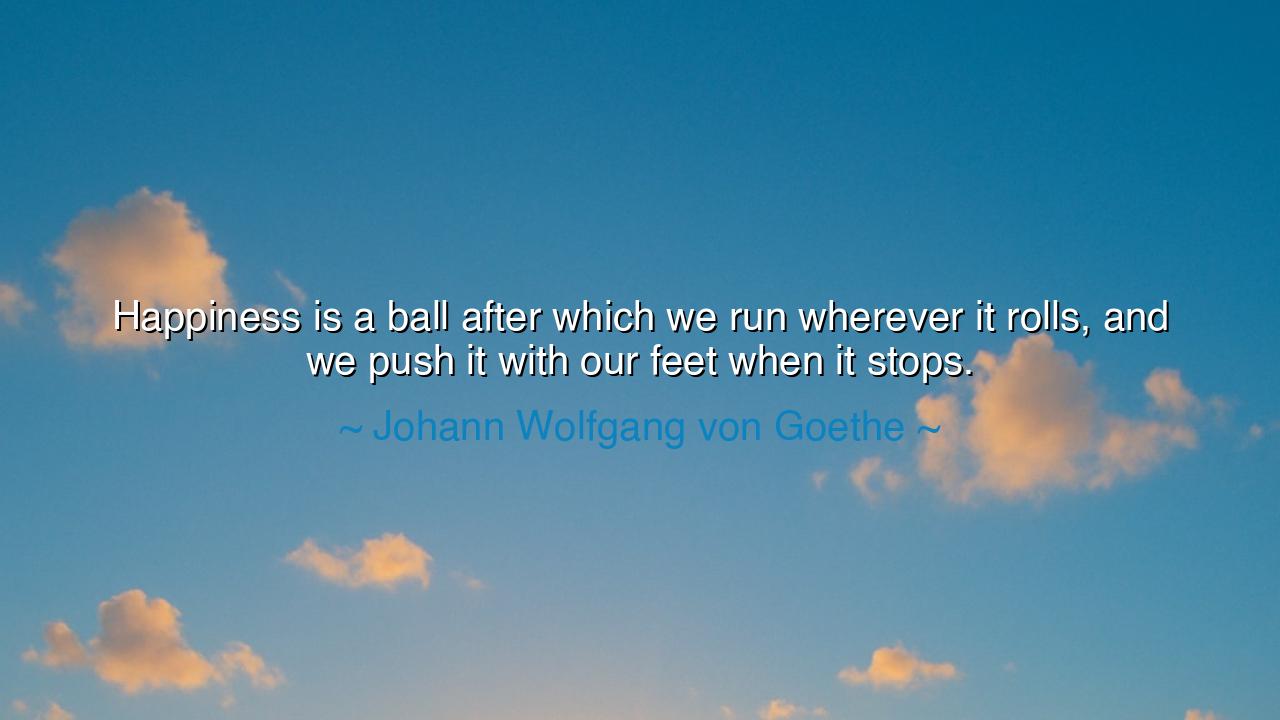
Happiness is a ball after which we run wherever it rolls, and we
Happiness is a ball after which we run wherever it rolls, and we push it with our feet when it stops.






Johann Wolfgang von Goethe, the great German poet and philosopher, once wrote with both tenderness and irony: “Happiness is a ball after which we run wherever it rolls, and we push it with our feet when it stops.” In this vivid image, he captures the restless nature of the human heart — ever in pursuit, never still. The ball of happiness rolls just ahead of us, gleaming in the sun, and we chase it with all our might. Yet when we reach it, when we finally hold what we desired, we grow restless again and push it away, longing for the thrill of pursuit once more. Goethe speaks here not merely of joy, but of desire itself, of that ceaseless yearning that both drives and torments mankind.
For Goethe, who observed the tides of the human spirit with a poet’s compassion, this image is no mere jest. He understood that happiness, as most men seek it, is an illusion of movement. We think it lies in the next achievement, the next love, the next possession, but once attained, it slips from our grasp like a toy that has lost its shine. The heart, unsatisfied, begins to look again to the horizon. Thus, the ball keeps rolling — not because it must, but because we cannot bear stillness. In our hunger for novelty, we mistake restlessness for life. Goethe warns us, with gentle melancholy, that unless we learn to be content where we stand, happiness will forever remain a traveler we can never catch.
The poet’s wisdom was not born in ease but in reflection. Goethe himself knew triumph and loss, fame and loneliness. He was a man of genius, honored by princes, adored by nations, yet he felt the same ache that dwells in every soul — that haunting question: Is this all? Even as his works were celebrated across Europe, he confessed in his later years that joy seemed always just beyond reach. Through his art, he came to understand that the chase for happiness outside oneself is endless. The true ball of contentment, he realized, rolls not through the streets of fortune, but within the quiet chambers of the heart.
History, too, gives us countless mirrors of Goethe’s truth. Think of Alexander the Great, who conquered the known world before the age of thirty, yet wept because there were no more worlds left to conquer. His ball of happiness had rolled across continents, and when it stopped, he kicked it again — not out of malice, but out of emptiness. The victory that once thrilled him could no longer satisfy him, for his joy was rooted in the chase, not in peace. And so, like Goethe’s metaphor, Alexander’s happiness rolled ever forward, always pursued, never possessed. Thus, the conqueror of worlds was himself conquered by longing.
The wisdom of this quote lies in its understanding of human desire. It teaches us that happiness cannot be captured by movement, by accumulation, or by endless striving. It is not found in the pursuit, nor in the possession, but in the pause — the moment when we allow ourselves to simply be. The ball will always roll again, for such is life; joys will come and go, fortunes will rise and fall. But if we can find contentment in each breath, in each fleeting moment, then we will have learned the art of holding happiness, not as a possession, but as a presence.
Goethe’s metaphor also reminds us of our tendency to dismiss the joy we already have. When happiness “stops,” when life grows calm or familiar, we often grow impatient. We push the ball forward, seeking new distractions, new pursuits, new challenges — believing that happiness lives only in the next thing. Yet, in doing so, we forget that the stillness of the moment holds the deepest kind of joy — the peace of gratitude. If only we would stop chasing, we might see that happiness had been sitting quietly at our feet all along.
So, my listener, take these words of the old sage as both warning and wisdom: do not chase happiness as though it were a prize to be won. Let it roll as it will, but walk beside it, not behind it. Learn to rest when it rests, to smile when it pauses, and to hold it gently when it is near. Be grateful for its presence, but do not weep when it moves on, for its motion is part of life’s dance. In every rise and fall of fortune, in every fleeting joy and fading sorrow, there lies the opportunity to find peace — not in the chase, but in the acceptance of the moment. Then, and only then, will you cease to run after happiness, for you will have become its home.






AAdministratorAdministrator
Welcome, honored guests. Please leave a comment, we will respond soon